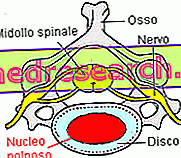Watch the video
X Watch the video on youtubeBenefits against high cholesterol
Walnuts are among the useful foods to keep cholesterol levels and cardiovascular risk under control, provided - naturally - they are included in the context of a balanced diet and a healthy lifestyle.

Examining in detail the nutritional properties of nuts, however, we see how this food can be quite useful in reducing blood cholesterol risk, but also by acting on other fronts.
A precious food
In nutritional terms, walnuts are particularly known for their high unsaturated fat content. Examining the accidic profile of dry food (see table), we note in fact how saturated fats represent less than 5% of the total lipid heritage; excellent, on the other hand, the content of polyunsaturated fats in the omega-six series, while the percentages of omega-three are discrete: nutrients that are quite rare in common foods, with the exception of fish and some vegetable oils (nuts, hemp, seeds) of flax and canola).
| Nutritional values dry walnuts (100 g) | |
| Power | 612 KCal |
| Carbohydrates | 12.05 g |
| Protein | 24.9 g |
| Total lipids | 56.98 |
| Saturated fats, total | 1.306 g |
| Monounsaturated fats, tot | 10.425 g |
| Polyunsaturated fats, tot | 42.741 g |
| of which omega-six of which omega-three | 33.727 g 8.718 g |
| Cholesterol | 0 mg |
| Vitamin E | 3.85 mg |
In various studies, the optimal synergy between polyunsaturated fats has proved useful in reducing triglyceride and LDL cholesterol levels, without significantly affecting HDL levels or even slightly increasing them. This last effect is also supported by the good content of monounsaturated fatty acids and in particular of oleic acid, the same that leads many nutritionists to recommend olive oil instead of normal seed oils.
Another precious nutrient that abounds in nuts is the amino acid arginine, a precursor of nitric oxide, a powerful vasodilator that contributes to the health of the arteries by keeping them flexible and preventing the formation of clots. Even vitamin E, contained in nuts in excellent quantities, could contribute - in synergy with arginine and omega-3 fats - to counteract the formation of atherosclerotic plaques, thanks to the known antioxidant properties.
Finally, again with a view to reducing cholesterol levels, the role of plant sterols (or phytosterols) and fibers could be very important, given that both contribute to reducing intestinal absorption of food lipids. Furthermore, the fibers favor the onset of a sense of satiety; for this reason, walnuts can be eaten as a snack together with an apple or another fresh fruit, or to dress the salad instead of the traditional seed oil.
Nuts yes, but in moderation!
Because of the high caloric value, if it is decided to increase the consumption of nuts to lower cholesterol values and promote cardiovascular health, it is essential to consume this food in place of - and not in addition to - other foods, for example as a break hunger instead of traditional high-calorie snacks (chips, brioche, various sweets). In fact, remember that severe overweight and obesity are probably the most faithful allies of cardiovascular disease; therefore, it is essential to control the caloric mountain of the diet avoiding the excesses repeated over time.



